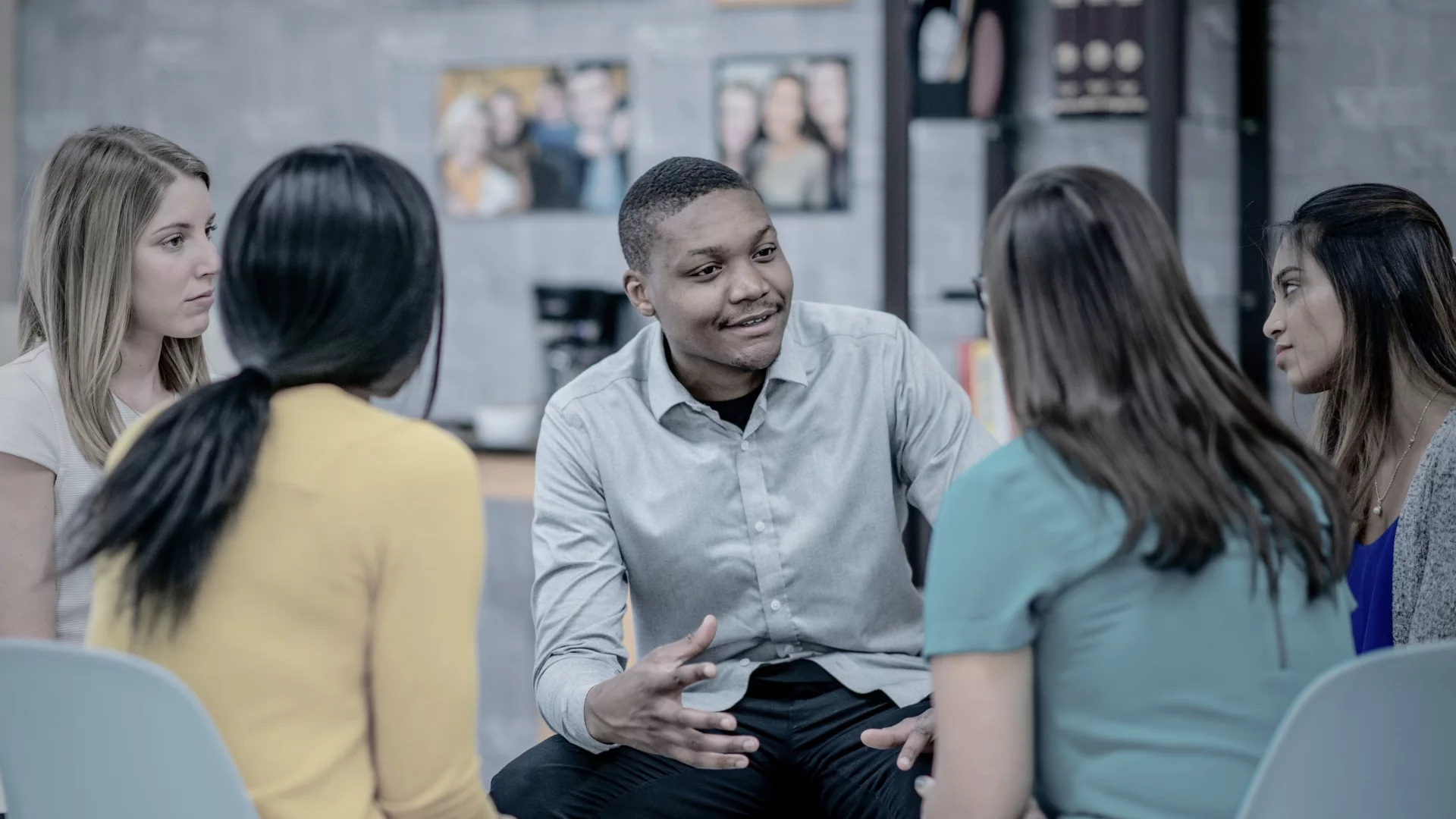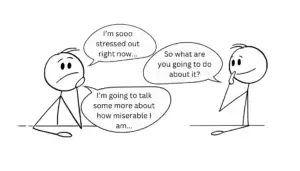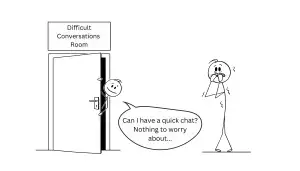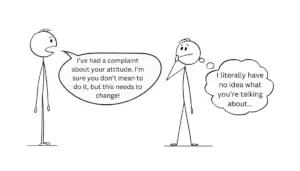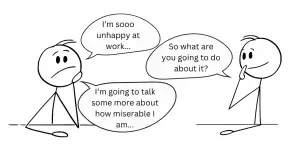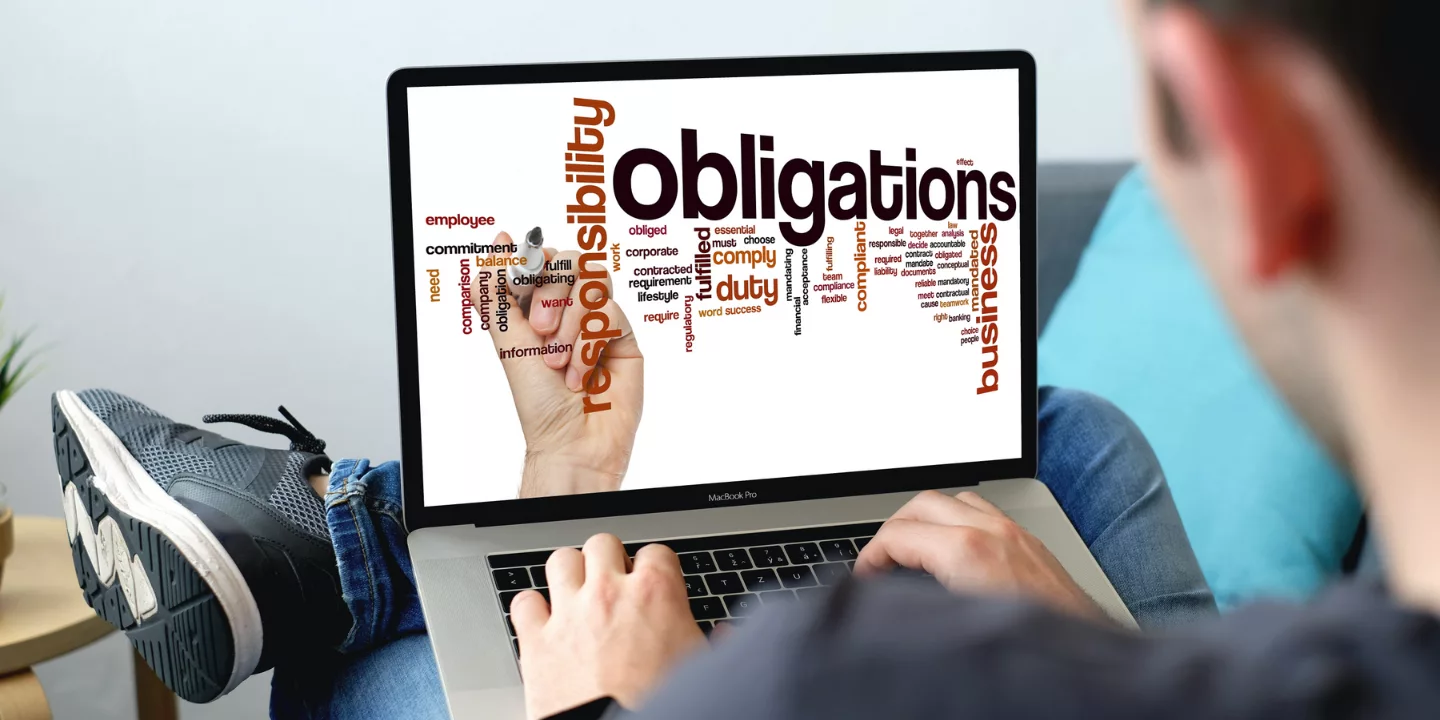coaching
Balancing support and challenge in difficult conversations...
How to balance support and challenge in difficult conversations...
by Karen Amos
An evergreen in my work is support for my clients around those dreaded difficult conversations. Whether it’s with staff, colleagues, clients, service-users (or just about anyone really), the mere thought of having to tackle tricky issues can cause huge stress all round. In my experience, much of that is completely avoidable.
One of the big worries people understandably have, is how to tackle a difficult issue and still retain a good working relationship with that person. Whilst it’s easy to let our inner chimp run wild and tell ourselves we don’t care, there are many pragmatic, if not humanistic reasons why we should take steps to retain good relations.
Here are a few:
• We need to retain and motivate good staff
• We need to keep open communications with customers, clients, funders and all other stakeholders
• We need to be seen as accessible, so people will still come to us if they’re experiencing problems
The worry about these issues – and not forgetting our visceral fears that someone may be upset at us – means we avoid holding these conversations. Or if the conversation is unavoidable, we end up downplaying the message.
This leaves us in a worse place than before, with a lack of trust and general misunderstanding, not to mention instilling a sense of injustice or resentment in our teams.
So what to do? Do we just crack on and ‘Say it as it is’?
Well, I’m a pretty straight-talking Yorkshire woman, but that’s not the approach I take. Certainly not in the ‘take me as you find me – warts and all’ approach I hear so often.

I’ve found the best balance around managing conversations. It comes from taking a coaching approach, of balancing ask and tell and also support and challenge. Here’s a phrase I absolutely love that I think encapsulates this and balances the two perfectly…
Having conversations with BACKBONE and HEART
Having the BACKBONE to say what needs to be said, clearly and concisely, BUT…
Having the HEART, the compassion and consideration, to remember there’s another human being with their own feelings on the other side of the conversation.
So here's a coaching question to be going on with:
On a scale of 1 - 10, how much courage do I have when it comes to difficult conversations and using the same scale, how well do I balance that with consideration and compassion?
If you’d like to develop People Management or Difficult Conversations skills for yourself or your team, click on the link for your sector below, to check out our latest training offers.
If you’ve any questions, or would like to discuss alternatives, do get in touch for an informal chat. EMAIL US, or book in an informal chat using the button below. We'll find out about the support you need and provide you with a no-obligation quote.
 Karen Amos is an executive coach and Director and Founder of BrightBird Coaching & Training. She supports business owners, managers and education leaders to get the best out of themselves and their teams. She brings a down-to-earth approach to improving working lives through better leadership, communication and working relationships.
Karen Amos is an executive coach and Director and Founder of BrightBird Coaching & Training. She supports business owners, managers and education leaders to get the best out of themselves and their teams. She brings a down-to-earth approach to improving working lives through better leadership, communication and working relationships.
Tel: 07714 855757 or email: [email protected][/vc_column_text][/vc_column][/vc_row]
Changing Mindsets to Workload and Wellbeing...
Changing Mindsets to Workload and Wellbeing...
by Karen Amos
As a coach, I never ascribe to the ‘one size fits all’ approach to professional development. But this can cause a problem when it comes to staff training. Wellbeing and Time Management training is a classic example. Every person in the room will have their own challenges and their own reasons for that challenge. Short of engaging a legion of 1-to-1 coaches (or whatever the collective noun for coaches is!), how can you possibly give everyone what they need?
We’ve solved this problem with our coaching approach to wellbeing and time management. By using a coaching approach, teams obtain the tools and resources to coach themselves and change mindsets.
So how does this work?
Here’s an example:
We work on the basic facts of working life. To be frank, they’re not exactly fluffy-bunny and hearts and roses. Here’s one:
There will always be too much to do on any given day/week/term/year…
OK, that sounds a bit depressing, but the fact is, this is exactly the stuff that most people know, but pretend isn’t so. This is the equivalent of sticking our fingers in our ears and loudly singing ‘la la la’ in the hope it will all go away.
With a coaching approach however, we face the issue. Coaching encourages people to face the reality of their situation, which then brings an inevitable question...
So now what…?
And this is where again a coaching approach comes in. By using open questions and other tools, people can work out their options and a solution that suits them as individuals.
Here's an exercise you can try...
One approach is to work out which bits on your list are your sole responsibility and where you might be taking responsibility for other people and their stuff. Simply listing this on a piece of paper can aid thinking and conversations and help you and your team members gain clarity. This means you're clear on who's work is who's and can plan exactly who is going to do what.
Best of all, a coaching approach always has a commitment to action running through it. Without that, teams inevitably indulge in a moan-fest and change is just wishful thinking. This also helps line managers to have better quality conversations with their teams afterwards, giving you much more impact for your investment of time, or in the case of training, money.
That's why all our training at BrightBird is based on a coaching-based approach. This gives much more longevity and value for money, by equipping teams with a toolkit they can put into practice straight away and will be applicable to their individual needs.
Check out the information below for more details and costs of how we can help you and your teams.
If you’d like to develop Wellbeing, People Management or Difficult Conversations skills for yourself or your team, click on the link for your sector below, to check out our latest training offers.
If you’ve any questions, or would like to discuss alternatives, do get in touch for an informal chat. EMAIL US, or book in an informal chat using the button below. We'll find out about the support you need and provide you with a no-obligation quote.
 Karen Amos is an executive coach and Director and Founder of BrightBird Coaching & Training. She supports business owners, managers and education leaders to get the best out of themselves and their teams. She brings a down-to-earth approach to improving working lives through better leadership, communication and working relationships.
Karen Amos is an executive coach and Director and Founder of BrightBird Coaching & Training. She supports business owners, managers and education leaders to get the best out of themselves and their teams. She brings a down-to-earth approach to improving working lives through better leadership, communication and working relationships.
Tel: 07714 855757 or email: [email protected][/vc_column_text][/vc_column][/vc_row]
5 Ways to Build Accountability...
5 Ways to Build Accountability...
by Karen Amos
If you’re frustrated with a lack of accountability and responsibility within your staff or management teams, then why not try a coaching approach. This area often seems too overwhelming or intractable to address, but a few mindset shifts can be a game-changer. This is what makes a coaching approach that bit different. It’s not about following some lengthy script, but allowing you to be the best of yourself and having much better conversations with your people. And that's got to be good for everyone...
Here are 5 tips to get you started…
1. Don’t try to keep everyone happy all the time…
That’s not your job as a manager and to be frank, it’s impossible. If you measure your success by other people’s happiness, you’re destined for a life of failure. Of course, you want to build a contented, motivated work team, but the way to this is through building trusting, honest relationships, with a clear sense of purpose – not acquiescing to every demand and preference you’re faced with. Which leads us to…
2. Get to the point…
Don’t fluff up your conversations with endless, ‘How are you’s’ and ‘How was your weekend?’ This just distracts from the point you’re wanting to make and leaves people feeling distrustful. People always thank you for getting to the point, so long as it’s done with consideration.
Add graphic in here…
3. Begin with the end in mind…
This is one of Stephen Covey’s 7 Habits of Highly Effective People. {1} When we’re addressing performance management or behaviour issues within our teams, we naturally focus on what we don’t want and what we want the person to stop doing. This inevitably leads to acrimonious conversations, where people feel criticised and defensive. Instead, take some time to work out what a positive outcome would look like, both from any conversation and also in the longer term. That way, you can focus on the solution, not the problem.
4. Don’t assume…
If you find yourself using phrases like, ‘Well, they should know…’, or, ‘They ought to be able to do that by now…’ you’re likely making assumptions. This isn’t to say you’re wrong, but until you have an open conversation with the other person you won’t know for sure. This is where a coaching approach to leadership comes to the fore. Rather than assuming and telling people what they should do, risking getting this wrong and alienating your staff, try asking probing questions regarding what their understanding of the issue is.
5. Start as you mean to go on…
I encounter so many issues where under-performance hasn’t been addressed in probation period, or just in a timely manner, then managers find themselves in a bind when matters don’t resolve themselves, or escalate. So always start as you mean to go on in your conversations. Set out expectations and build collaboration from day one. Whilst you may worry about being ‘nit-picky’ over small issues, a supportive, coaching conversation can bring people on track quickly, or if not, at least give you the evidence you need to implement more formal performance management procedures. And if you haven’t always done this? Well, the best time to start is now!
So, as a coach I wouldn't be doing my job if I didn't ask the question... 'Which of these are you going to put in place, starting today?'
I hope you find these tips useful and do get in touch if you’ve any questions, or just for an informal chat or listening ear. We’re always happy to help
1. Covey, S.R., (2004) The 7 Habits of Highly Successful People. London: Simon & Schuster.
If you’d like to develop People Management or Difficult Conversations skills for yourself or your team, check out our latest training offers below. If you’ve any questions, or would like to discuss alternatives, do get in touch for an informal chat.
Click on the link below to find out more:
Or why not EMAIL US, or book in an informal chat using the button below. We'll find out about the support you need and provide you with a no-obligation quote.
 Karen Amos is an executive coach and Director and Founder of BrightBird Coaching & Training. She supports business owners, managers and education leaders to get the best out of themselves and their teams. She brings a down-to-earth approach to improving working lives through better leadership, communication and working relationships.
Karen Amos is an executive coach and Director and Founder of BrightBird Coaching & Training. She supports business owners, managers and education leaders to get the best out of themselves and their teams. She brings a down-to-earth approach to improving working lives through better leadership, communication and working relationships.
Tel: 07714 855757 or email: [email protected][/vc_column_text][/vc_column][/vc_row]
Tips to Make Difficult Conversations Easier
Tips to Make Difficult Conversations Easier...
by Karen Amos
I’ve been thinking a lot about the Difficult Conversations and Leadership training I deliver – particularly how people’s language and mindset affect their success. The usual expectation for this type of training is that if only we could learn a nifty phrase or approach, then we’d smash every difficult conversation, or be that amazing, inspirational leader.
Having an ethical business, I have to be honest and say, unfortunately there’s no such thing.
BUT… Don’t despair!
By being more conscious of our language and mindset through a coaching approach, we can instantly change a ‘difficult conversation’ to… just a ‘conversation’.
How much positive impact would that have on your life, both at work and personally? You need to speak to someone about something and you do. No worry, no dread, no hysterics - and no stress!
Here’s how it works. Let’s take the words ‘Difficult Conversation’. By using the word ‘difficult’, we have already set an expectation – that it’s going to be difficult/problematic/tough/upsetting, etc. This means we approach the situation from a negative or defensive standpoint from the start.
We frequently use the same type of language about people. They’re ‘difficult’, ‘awkward’, ‘a nightmare’ and on it goes. I’m sure you can see how this can taint our approach from the outset and set us on the wrong trajectory.
Now don’t get me wrong – I’m certainly not suggesting that we can magically transform people’s behaviour and attitudes just by changing a word, but you’d be surprised at the difference it can make.
Here are some coaching questions to get you thinking about your own mindset on these issues…
- What is it about this conversation that I see as difficult?
- What’s my evidence this is correct? Or is this assumption or fear on my part? (NB: there may be objective evidence and you should certainly act on this.)
- What would I need to think and feel differently in order to see this situation or person in neutral, or even positive terms? (e.g. If we’ve labelled someone as ‘difficult’, could we perhaps see they’re ‘anxious’, or ‘disliking uncertainty’? Or that we’re ‘helping to solve a problem’?)
- What would I lose or risk by changing my current thinking or beliefs about the situation or person?
- What could I gain from describing the situation or person in more neutral or positive terms?
If you’d like to develop People Management or Difficult Conversations skills for yourself or your team, check out our latest training offers below. If you’ve any questions, or would like to discuss alternatives, do get in touch for an informal chat.
Click on the link below to find out more:
Or why not EMAIL US, or book in an informal chat using the button below. We'll find out about the support you need and provide you with a no-obligation quote.
 Karen Amos is an executive coach and Director and Founder of BrightBird Coaching & Training. She supports business owners, managers and education leaders to get the best out of themselves and their teams. She brings a down-to-earth approach to improving working lives through better leadership, communication and working relationships.
Karen Amos is an executive coach and Director and Founder of BrightBird Coaching & Training. She supports business owners, managers and education leaders to get the best out of themselves and their teams. She brings a down-to-earth approach to improving working lives through better leadership, communication and working relationships.
Tel: 07714 855757 or email: [email protected][/vc_column_text][/vc_column][/vc_row]
A Fresh Approach to Performance Management...
A Fresh Approach to Performance Management...
by Karen Amos
Life as a coach can be a strange way to earn a living. It can appear very negative on first inspection. I inhabit a world of performance management and even disciplinary proceedings. But it’s actually anything but negative.
You know the feeling – yet another member of staff has done or said something they shouldn’t have. (Again! – Cue slap head/rolling eyes emojis) You’re in despair. They’re a great member of staff, you can really see what they bring to the team, but there’s just this one recurring problem.
A classic example I encounter is the person who doesn’t communicate appropriately. This could be anything from a manager, to a front-line worker. Somewhere along the line, there is a trail of informal and even formal complaints about this person’s 'attitude' and communication style.
Or perhaps it’s their self-management in their role, such as managing workload.
So you do the right thing and ‘have a word’. You tell them what they’re doing isn’t appropriate, etc. and off they go. To do the exact same thing again. And on it goes, until finally your days are filled with grievance and disciplinary hearings. The whole thing often has an inevitability about it, BUT – there is another way!
It’s a coaching approach… Read on to find out how…
Traditionally, disciplinary and performance management has relied on telling people what we don’t want them to do. This definitely has its place in your management toolkit.
The problem with this approach is 3-fold:
- It doesn’t get to the root of the problem
- It doesn’t help them find the resources to work out what they should do instead
- It doesn’t effectively build personal responsibility and accountability
This is where coaching as an approach comes into its own.
Before we go any further, do understand that coaching is no fluffy bunny approach – in fact just the opposite. This is a highly effective way to get to the root of the problem and give the responsibility for solving this right back to the person.
Here are two ways you can implement this approach in your workplace:
1. Take a coaching approach to managing people
This is simply to be clear about what you expect from the person, but then to use a coaching approach and questions to help them to come up with actions and solutions to resolve the issue.
This has the additional advantage of you easily being able to hold the person to account for any actions they set, which means they’re much more likely to follow this through, rather than taking your directions and suggestions.
2. Engaging a 1-to-1 professional coach
An external coach will have specialised tools and approaches to quickly get to the crux of the issue with the person. Often people don’t know what they don’t know, so using these approaches and a combination of coaching, training and mentoring means we can help the person explore and implement alternative ways to resolve the issue.
Areas I frequently work on with clients include building better communication styles with staff, managing their stress in high-pressure environments and changing mindsets to workload management.
As managers, you often don’t have the time to do this yourself and the confidential nature of coaching means people are much less defensive and likely to open up to the real challenges they’re facing.
If you’d like to develop People Management or Difficult Conversations skills for yourself or your team, check out our latest training offers below.
If you’ve any questions, or would like to discuss alternatives, do get in touch for an informal chat. EMAIL US, or book in an informal chat using the button below. We'll find out about the support you need and provide you with a no-obligation quote.
 Karen Amos is an executive coach and Director and Founder of BrightBird Coaching & Training. She supports business owners, managers and education leaders to get the best out of themselves and their teams. She brings a down-to-earth approach to improving working lives through better leadership, communication and working relationships.
Karen Amos is an executive coach and Director and Founder of BrightBird Coaching & Training. She supports business owners, managers and education leaders to get the best out of themselves and their teams. She brings a down-to-earth approach to improving working lives through better leadership, communication and working relationships.
Tel: 07714 855757 or email:
Tips to Turn a Coaching Approach into your Leadership Superpower
Tips to Turn a Coaching Approach into your Leadership Superpower
by Karen Amos
I’ve just finished facilitating BrightBird’s latest Effective People Management programme. As with the previous programmes, participants bring along concerns, anxieties and ‘Is it me…?’ feelings around the challenges of managing people.
Interestingly, there are always common themes. Most people come with a sense of frustration of how they can’t just, ‘Get on with the job,’ and a feeling of, ‘Why is this always so difficult?’
This is usually accompanied by some sense of one step forward and two steps back, or feeling that managing people is like trying to nail jelly to a tree.
As a consequence, I find many managers of all levels feel they end up playing a role, rather than being themselves. And it’s not a role they enjoy. It’s often the role of ‘bad guy’ and whilst they’re prepared to step up and do this, it’s not one most of us would choose given an alternative.
My view is that no-one needs to ‘play’ anything. The ‘bad guy’ scenario inevitably leads us down a one-way street, with all concerned doubling down into increasingly entrenched positions. This is difficult if not impossible to step away from and often results in demotivated teams, or even a brain drain from your organisation.
I genuinely don’t believe working life needs to be so difficult – for managers and employees alike.
That’s why I’m on a mission to improve the quality of working life for everyone.
The problem is, most people in my experience, embark on a management career because they’re great at what they do. I mean, who seriously sets out in their career thinking, ‘I know, I’d love to be the line manager of tons of awkward people!’ Probably the same ones who look up ‘How to herd cats’ on google.
No, the fact is that we usually gain promotion because we’re the expert in our field. The best sales-person, the best teacher, etc., etc. The problem is, no-one told us how to be managers. Very few people are born with an innate ability to lead other people. But it can be learned.
And this is where a coaching approach becomes a bit of a superpower in my experience. I’ve used this approach personally and seen my clients implement this with fantastic results. It’s definitely an approach that sees compound benefits, with exponential growth in performance over a relatively short period of time. On the surface, it’s counterintuitive. Management is about putting the right people in the right place isn’t it? Well, yes… and no. How about seeing successful management as having your people put themselves in the right place?
So where to start? Here are a few tips to improve your coaching leadership style, along with some questions to help build insight into what’s going on for you.
1. Listen – I mean really listen. Listening isn’t about waiting for your turn to speak, or jumping in to close down the other person half way through a sentence.
Ask yourself – How would my peers and team members rate me as a listener?
2. Understand – Only when we’ve listened will we understand the other person’s viewpoint. The challenge is to show them we understand – even when we don’t agree with them!
Ask yourself – How often do I find myself or the other person saying some variation of, ‘Yeah, but…’ in my conversations? (This is a classic sign of a lack of understanding being demonstrated.)
3. Collaborate – It’s not your responsibility as a manager to solve everything on your own. That’s why you have a team and why it’s important to know who is responsible and accountable for what.
Ask yourself – Do I feel I’m carrying a burden of responsibility that other people don’t share in my team and how can I share this more equally?
4. Challenge – There are many types of challenge, but I like to call a coaching approach ‘challenge with a small ‘c’’. This doesn’t mean going out of your way to make people uncomfortable, or being on some kind of power trip. Instead, it means not accepting everything at face value and using coaching questions to explore and promote personal responsibility and accountability.
Ask yourself – Do I feel that members of your team are tying me in knots, or I come out of conversations wondering what just happened? If so, how can I be more enquiring in my conversations to find out more?
5. Problem solve – Coaching at its heart, is a problem-solving approach. You want something better and have a plan on how to get there. This is a gift for any effective manager to get the right results.
Ask yourself – Do my team get bogged down in problems and look to me to solve them, or do they naturally seek solutions themselves? If it’s the former, what can I do to enable them to problem-solve naturally?
Hopefully, you’ve now a few pointers to begin to develop your coaching leadership style.
If you’d like to learn more about how to take a coaching approach to Managing Difficult Conversations and people management, check out our latest courses below:
Or why not EMAIL US, or book in an informal chat using the button below. We’ll find out about the support you need and provide you with a no-obligation quote.
 Karen Amos is an executive coach and Director and Founder of BrightBird Coaching & Training. She supports business owners, managers and education leaders to get the best out of themselves and their teams. She brings a down-to-earth approach to improving working lives through better leadership, communication and working relationships.
Karen Amos is an executive coach and Director and Founder of BrightBird Coaching & Training. She supports business owners, managers and education leaders to get the best out of themselves and their teams. She brings a down-to-earth approach to improving working lives through better leadership, communication and working relationships.
Tel: 07714 855757 or email: [email protected]
Why it's not normal to be happy - and what you should do instead...
Why it's not normal to be happy - and what you should do instead...
by Karen Amos
I’ve been doing a lot of reading recently – around happiness. Actually, that’s not exactly true – I’ve been reading about how so many of us have drunk the ‘happiness Kool Aid’ and ironically, find ourselves miserable that we’re failing at happiness. As an occasionally grumpy, middle-aged Yorkshire woman, I find this fascinating.
Recent publications, such as Bad Therapy, The Antidote and The Anxious Generation are showing that for many of us, modern living standards have never been better, yet increasing numbers of young people and adults find themselves so unhappy they resort to therapy, including medication. The question surely is, if this is such an effective cure, why are people still unhappy?
Many years ago I was a student nurse. There are many stand outs from my training, good and bad, but one that changed my life was a sentence uttered by a lecturer on Mental Health…
‘The most you can expect is to be reasonably content most of the time.’
That’s it. And it profoundly changed the way I viewed my world and my expectations. To the extent that I am – reasonably content most of the time. So to that lecturer, wherever you are – thank you.
This may seem a bit lack-lustre for a coach, I admit. After all, aren’t we meant to be uber positive and seeking Nirvana-like states of happiness and success? Well some are I guess, but not me. I’m about doing.
Don’t get me wrong, I do believe there is a right time to seek therapy. I refer clients to specialist therapists if I find we’re addressing something that’s out of my area of expertise. In fact, I have sought counselling on occasions at certain points in my life and regularly use psychoanalytical models with my clients to help them make sense of their world.
But there is a danger in rumination. We won’t make ourselves or others resilient to the pressures of life by constantly going over the past and looking inwards.
So what is the answer?
I believe the answer lies in a stoical approach to coaching. This isn’t the ‘British stiff upper lip’ version, but the true version of Stoicism that says…
In life, circumstances will continue to challenge us, but it is within our gift to decide how we will respond to them.
Often coaching is seen as a bit ‘Pollyanna – all in the garden is rosy’, which is why many people (justifiably) call out, ‘toxic positivity’ at the relentless ‘just think positive’ messages. In fact coaching at its best is nothing of the sort. Tony Robbins has a great approach to this. I paraphrase:
Just relying on positive thinking alone is like going into your garden and chanting ‘there are no weeds, there are no weeds’, when your garden’s clearly full of weeds. You need to get in there and pull them out!
We need to accept that life is frequently challenging and bad stuff happens. Rather than passively accepting that, drowning in self-misery, or railing against the universe, we need to roll up our sleeves and deal with it. We need to take action that will serve us well.
My clients know I’m always going to come around to some version of this question…
‘So what are you going to do about it?’
That’s it – you want something to change – go change it! And if it’s not in your control to change it? Then work out what you’ll do to deal with that.
Here are a few coaching questions to get you started:
- What’s my main challenge here?
- What small, practical action I can take right now that will serve me well?
- Is trying to fix this, worth the energy and time?
- Is there anything I need to accept isn’t in my control? And what will I do to focus my energies elsewhere?
Remember, we’re all human and it’s important to acknowledge our feelings. If something bad happens, it’s perfectly natural and healthy to feel down, upset or angry. The problem is that simply dwelling on these feelings and responses will not serve us well, or help our situation. It’s therefore in your gift and best interests to start to coach yourself to a better way forward that will.
If you’d like to learn more about how to take a coaching approach to Managing Difficult Conversations and people management, check out our training courses below:
If you would like to find out more about BrightBird’s 1-to-1 and team coaching, check out our web pages using the links below:
Or why not EMAIL US, or book in an informal chat using the button below. We'll find out about the support you need and provide you with a no-obligation quote.
Further reading:
Bad Therapy: Why the Kids Aren't Growing Up - By Abigail Shrier. Publisher: Sentinel
The Anxious Generation: How the Great Rewiring of Childhood Is Causing an Epidemic of Mental Illness - By Jonathon Haidt. Publisher: Allen Lane
The Antidote: Happiness for People Who Can't Stand Positive Thinking - By Oliver Burkeman. Publisher: Vintage
Happy: Why More or Less Everything Is Absolutely Fine - By Derren Brown. Publisher: Corgi
 Karen Amos is an executive coach and Director and Founder of BrightBird Coaching & Training. She supports business owners, managers and education leaders to get the best out of themselves and their teams. She brings a down-to-earth approach to improving working lives through better leadership, communication and working relationships.
Karen Amos is an executive coach and Director and Founder of BrightBird Coaching & Training. She supports business owners, managers and education leaders to get the best out of themselves and their teams. She brings a down-to-earth approach to improving working lives through better leadership, communication and working relationships.
Tel: 07714 855757 or email: [email protected]
5 Tips to Help You Switch Off From Work
5 Tips to Help You Switch Off From Work
By Karen Amos
I see a lot of posts on social media about people who find they can't switch off during the holidays. Is this you? Whether you're going away somewhere or having a break at home, the feeling that your long awaited holiday is finally here, but your mind's whirring like a machine and all you can think about is how many jobs there are to do when you get back - if not before!
As a note of reassurance here, you're not alone. The pace of the working week can seem relentless. For some the 'end of the (working) day' never really comes, particularly with the advent of home-working. This means we're living in an 'Always On' state of high arousal levels and stress.
In simple terms, this means rather than your adrenaline response shutting off, allowing your stress to ebb and flow naturally, your brain has its foot on the gas pedal and keeps it there. This response is supposed to be fleeting - just long enough for you to get yourself out of imminent danger. In the case of workplace stress, it can remain in place. For months sometimes. This leaves your body and brain unable to simply flick the switch to turn off the response, even though it's not needed any more.
So what to do? Here are a few tips and coaching questions to help train your brain to lift its foot off your stress gas pedal, so you can work and rest productively. Remember, the aim isn't to solve all of these in one go. No point ending up more stressed out by trying to fix your stress levels! Instead, pick one area and take one small action at a time...
Tip #1:
See time off as an investment - Explore and clarify to yourself how you will be more productive if you take time off to rest, whether that's for an evening, a weekend or a holiday. Set out clearly what you would gain - naming it makes all the difference, then you know what you're aiming for.
Tip #2:
Make a list of everything that needs to be done - Include everything, big or small. This allows you to stop worrying that you’ve forgotten something and allows you to stop spinning those mental plates. Remind yourself you can add any jobs, when they come into your head as you go along.
Tip #3:
Prioritise what needs to be done – Do a reality check and ask yourself - Is this thing possible? – is it essential? – Also ask yourself what would happen if this wasn’t completed before the end of the month, or if you were off sick? Chances are most of these tasks will be less 'urgent' and 'important' than you feel they are right now. Where you can, block out things into a basic timescale or planner.
Tip #4:
Switch off your media – This means no checking in on emails and social media. Give yourself a digital detox and if you find this makes you anxious or you have such strong ingrained habits to pick up your phone, put your phone or laptop out of reach at least for a short while.
Tip #5:
Find something practical to do – If you engage in a practical activity, you're more likely to be distracted from the anxious feelings, at least for a while. Get outdoors for some exercise. Not only is this a great stress-buster, it will also help you to sleep. Whether it's indoors or outdoors, book activities in that you enjoy and revel in that restorative distraction. Why not catch up with friends and family too? Having a laugh and talking with others is a great distraction. Just stick to those positive people in your life and avoid the 'joy stealers'!
Hopefully, these will help you set some positive habits and ensure you have some quality time off so you're well-rested and on top of your game when you return to work. In the meantime, here's wishing everyone a positive and productive month, no matter what you have planned!
Find out about our training courses and coaching using the links below:
Or why not EMAIL US, or book in an informal chat using the button below. We'll find out about the support you need and provide you with a no-obligation quote.
 Karen Amos is an executive coach and founder of BrightBird Coaching & Training. She supports business owners and managers who are feeling the pressure, to get the best out of themselves and their teams. She brings a practical, down-to-earth approach to improving working lives through better leadership, communication and working relationships.
Karen Amos is an executive coach and founder of BrightBird Coaching & Training. She supports business owners and managers who are feeling the pressure, to get the best out of themselves and their teams. She brings a practical, down-to-earth approach to improving working lives through better leadership, communication and working relationships.
Want to be a coaching manager? Here's the magic ingredient...
Want to be a coaching manager? Here's the magic ingredient...
By Karen Amos
I’m feel fortunate that there are lots of managers who are tuning into in how coaching can help them and their teams.
It’s probably no surprise that I firmly believe coaching can completely transform the behaviour, mindset and performance of teams in the workplace. In fact, I more than believe it, I’ve seen the results for myself.
The thing is in our ever-busy working lives, time is at a premium, so many people are looking for a magic ingredient that will turn them into a coach. The magic ingredient that means they can start to reap the benefits.
As a result, I thought I’d bring in a quick reality check around expectations and what you CAN do, to be a great coaching manager.
Let’s start off with a few of the ‘myths’ I encounter…
Myth 1 – Reading a coaching book will turn me into a great coach
Myth 2 – Getting a coaching qualification will turn me into a great coach
Myth 3 – Going on a coaching course will turn me into a great coach
Actually, all of the above will help. The bad news however, is that reading a book, getting a qualification, or going on a course will never turn you into an amazing coaching manager overnight.
In order to coach, you need to learn the skills and techniques to ask great coaching questions, along with other tools. But here’s the challenge…
If you don’t actually DO anything differently – if you never practice these techniques and skills, nothing will change.
I had an acquaintance who bought every self-help book known to human-kind – or so it seemed! The problem is none of it changed her life in the slightest. Does this mean the books didn’t work? Not at all. The fact is, not only did she rarely get past the first chapter, she never put any of her learning into practice – and if she did, not consistently.
So unfortunately you won’t be able to become a better coach through a process of osmosis, where learning will radiate off your bookshelf, or training course and magically transform you into the coach you’d like to be.
If these don’t work – what does?
This means getting out of your comfort zone. Walking the walk as a manager. Trying at least one approach, or question very consciously even once a day.
If you’re about to think, ‘Yeah, but it’s not that simple…’, then I would ask you to look inwards. I’m guessing you want to start coaching to help people change, to improve their performance. If that’s the case then we need to walk the walk as managers and leaders. Ask yourself, ‘should I be expecting people to change, do things differently and get out of their comfort zone, if I’m not prepared to do so myself?’
Another thing to consider is to build coaching conversations into your daily interactions. Any conversation with another person has the potential to be a coaching conversation. It involves listening and understanding the other person’s point of view, with a healthy dose of curiosity to explore what’s really going on and help them find their own solution to any problems.
Remember that coaching isn't about feeling clever whilst you fire lots of 'challenging' questions at someone. At it's heart, it's about great communication - taking the time to listen, understand and helping the other person work out a solution.
So go on, give it a go!
Coaching Question:
What one step could you put in place today to help you improve your coaching and communication skills?
If you’d like to know more about how our fully-interactive coaching skills courses can help you implement a coaching approach in your workplace, check out our coaching skills for managers mini-programmes. There's NO HOMEWORK and NO ROLEPLAY! Just lots of practical tools, approaches, discussion and practice, so you can put your learning into place straight away.
For schools and education settings
For business and organisations
Or check out our great value in-house training options:
For schools and education settings
For business and organisations
Or call us: 07714 855757
or click HERE to book in a short, no-obligation chat
Karen Amos is an executive coach and founder of BrightBird Coaching & Training. She supports leaders and managers to get the best out of themselves and their teams. She brings a down-to-earth, practical approach to improving working lives through better leadership, communication and working relationships.
3 reasons your team may be resistant to change – and what you can do about it!
3 reasons your team may be resistant to change – and what you can do about it!
By Karen Amos
I’ve been busy delivering the ‘Managing Change’ session from my Effective People Management programmes these last few weeks. This is definitely one of those subjects that at first glance seems easy, but is a veritable Russian doll when you start to unpack it.
I recall times throughout my career where change has been well implemented and accepted, indeed embraced by teams and many more times when I’ve just emitted an inward (and sometimes outward) groan when informed of yet another new strategy/change/initiative [delete as appropriate]. On that note, isn’t it strange what a word so positive as ‘initiative’ can invoke such an energy dump in a different context?
Whilst the vast majority of change is instigated with positive intentions – i.e. to make things better – it can so quickly invoke a negative response and be the cause of low staff morale and even increase staff turnover if handled badly.
Here are 3 reasons you may be experiencing resistance to change from your team (or even personally) and a coaching perspective on how to address this…
1. Your team doesn’t understand why the change is necessary
This is about supporting your team to understand the reason behind the change. There’s an understandable filter that takes place where information is cascaded down an organisation and people in less senior roles are, often rightly, given less detail than people who are more senior. I do think we need to treat people as the adults they are though. To paraphrase Nietzsche, the person with a ‘why’ can tolerate almost any ‘how’.
Solution:
Consider the perspectives and experience of your team. It’s easy to forget as a leader that we have much more information and control than those we manage. An honest appraisal, including the benefits of the changes and the consequences of not taking this course of action will always be appreciated. Over time, your teams will accept you’re trustworthy and there’s no game playing going on. Remember, if there is sensitive information you can’t share, be honest about that too.
2. People don’t feel involved or listened to
In the midst of all the activity in implementing a new change, time to discuss, consult and more importantly, listen can come a poor second. Remember that as manager and leader, you naturally have much more control and usually knowledge, about the change. It’s easy to forget that your team don’t share this.
Solution:
Hold regular check-ins with your team and allow people to voice their concerns. It’s understandable that you may not want to seek this out, lest it turn into another ‘moan-fest’, but hearing people out and giving information where needed will prevent people from lagging behind, or at worst being so engaged they decide to leave the organisation altogether.
3. Your people have ‘change fatigue’
Have you ever stopped to consider that change just seems to be a permanent fixture of working life? Lots of my clients comment that there’s never a pause to take a breath and reflect and let the changes embed. It’s either one change, then straight into another, or what’s more usual, multiple changes going on at the same time. It can be hard for teams and indeed ourselves as leaders, to truly evaluate what the impact of the change is. With this comes a sense of never quite achieving an end result, leading to frustration and low motivation.
Solution:
Ensure you consult with your team to build in mini-goals and celebrate progress and ‘wins’ throughout the change process. Where possible, give people a project, or part of a project to own and champion, in a way that plays to their strengths and things they enjoy if possible. That way, they can have more autonomy and also see they’ve played a clear part in achieving the overall goal. Whilst it’s not always possible, be conscious of implementing multiple changes and reduce these where possible to allow new ways of working to embed themselves, even for a short time. This will then be assimilated into your organisation’s culture and people will be more enthused for the next change.
I hope that helps with a little food for thought regarding change in your setting or organisation.
If you’d like to know more about how we can support your leaders and teams with 1-to-1 or team coaching, or would like to discuss our in-house live, online leadership programmes, you can:
Email us at: [email protected]
Or call us: 07714 855757
or click HERE to book in a short, no-obligation chat
Karen Amos is an executive coach and founder of BrightBird Coaching & Training. She supports leaders and managers to get the best out of themselves and their teams. She brings a down-to-earth, practical approach to improving working lives through better leadership, communication and working relationships.

